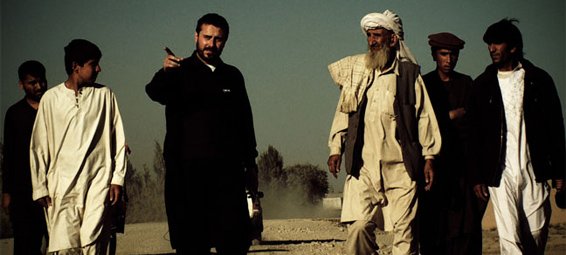If a miscalculated drone strike isn’t accompanied by the moody sounds of the Kronos Quartet, is it still tragic? That’s what I was asking myself halfway through an afternoon viewing of Jeremy Scahill’s often heavy-handed documentary, Dirty Wars: The World is a Battlefield, which is also a recently published book by the same name.
The author rose to notoriety in 2007 with the award-winning Blackwater: The Rise of the World’s Most Powerful Mercenary Army, and can be arguably credited with making the Blackwater name a household one, much as he became a recognizable talking head in the dubious world of television news punditry. The film goes to great length to let you know that Scahill is above all that noise, however. A joke at his expense from Jay Leno—which receives an unintentionally hilarious and catty dagger stare from Scahill in slow-mo—is soundtracked by the same unsubtle mood music later used to emphasize that the death of innocents is unjust. For a film filled from title to credits with such valuable information, these moments of unbalance threaten to unspool the message into a pile of overbearing cinematic cliche.
Scahill, aside from being a handsome on-screen purveyor of truth, is also the foreign correspondent for the Nation, and is an accomplished investigative journalist. This fact is so meta-infused over the course of the film that there is no way you could mistake him for anything but a journalistic private dick-type who stops at nothing for his story. The problem is that the public can easily grasp the concept that Scahill is a relentless journalist without closeup shots of him taking notes. The fact that Scahill jumps from remote areas of Afghanistan, to Yemen, to Somalia, and back is evidence enough. Anytime the story retreats back to Scahill as superhero investigator, his narration comes off like The Wolverine scribbling in a notepad and muttering vengefully to himself.
The film is directed by another journalist, Richard Rowley, and in addtion to focusing on Scahill, the film’s subjects range from the heartbreaking child victims of ceaseless conflict, to a shadowy figure with insider info on The Department of Defense, to terrifyingly cold-blooded warlords. And of course, President Obama, though only in the form of press conference clips.
Dirty Wars’ overriding theme is that JSOC (Joint Special Operations Command) is a covert US Military element that has existed since the time of the Iran Hostage crisis, and yet has gone largely unknown despite existing for thirty-three years. Scahill begins obsessively looking for a link between JSOC and a 2010 family massacre in Gardez, Afghanistan, but his story is (and therefore “the world”) turned “upside down” after JSOC is credited for the killing of Osama Bin Laden in 2011. Scahill attempts to prove what he considers a rogue element of the US Military to be as controversial as he revealed Blackwater to be. This time it’s a much harder sell, due to JSOC’s sudden unlikely star power.
With Bin Laden gone, the story turns more of its focus on the controversial topic of drone strikes, specifically the hunt for the internationally popular cleric, Anwar al-Awlaki, who is a particularly notable target due to his American citizenship. If you are even a casual follower of the news, be it biased, mainstream, or both, you know how this story ends.
For a crew seemingly so well-versed in history, the film is almost told as if Obama invented covert military operations and botched anti-terror bombing campaigns. Bush seems to be nearly let off the hook despite starting the drone program, at least in its current incarnation. Clinton’s sixty six target-missing Tomahawk missiles off the coast of Afghanistan, which were meant for Bin Laden’s camp in 1998, and Sudanese medicine factory strike, also meant for Al Qaeda in 1998 (for instance), don’t warrant mentions. Yet Scahill’s focus on the 2009 bombing of al-Majalah was also a coastal attack involving cruise missiles supposedly looking for a terror target, and the comparison seems obvious. Targeted killings launched by the United States have been an issue at least since the 1960s, as evidenced by the still unresolved issue of the Phoenix Program. But even Scahill seems to be questioning the public being “obsessed with drones” in a recent roundtable discussion.
Due to that particular obsession, not to mention the since-uncovered NSA scandal, these are tough times for Obama-supporters and leftists both, and Scahill seems to thrive on causing anxiety to apologists and defenders of the administration. The journalist is not afraid to toy with the strange bedfellow aspects that drones and human rights abuses have caused in uniting both conservatives and those on the left. Almost unsettlingly, the only politician Scahill is seen agreeing with on-screen in one of his many talk show appearances is Pat Buchanan. Long shots of Scahill’s ordinary shopping routine in a Brooklyn bodega are given the same ominous qualities as the ruins of Mogadishu. It’s a slightly alarmist world-view that is at least consistent, if nothing else, and Dirty Wars should be seen despite its own inconsistencies.





